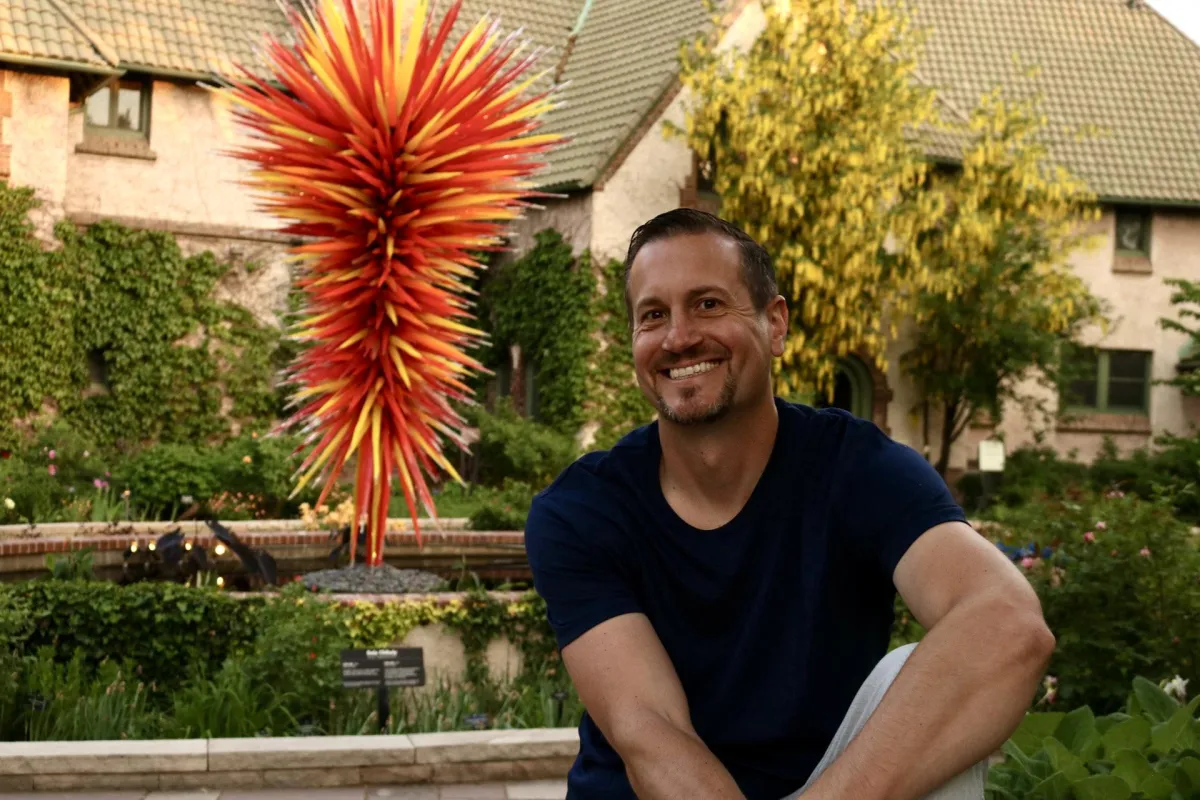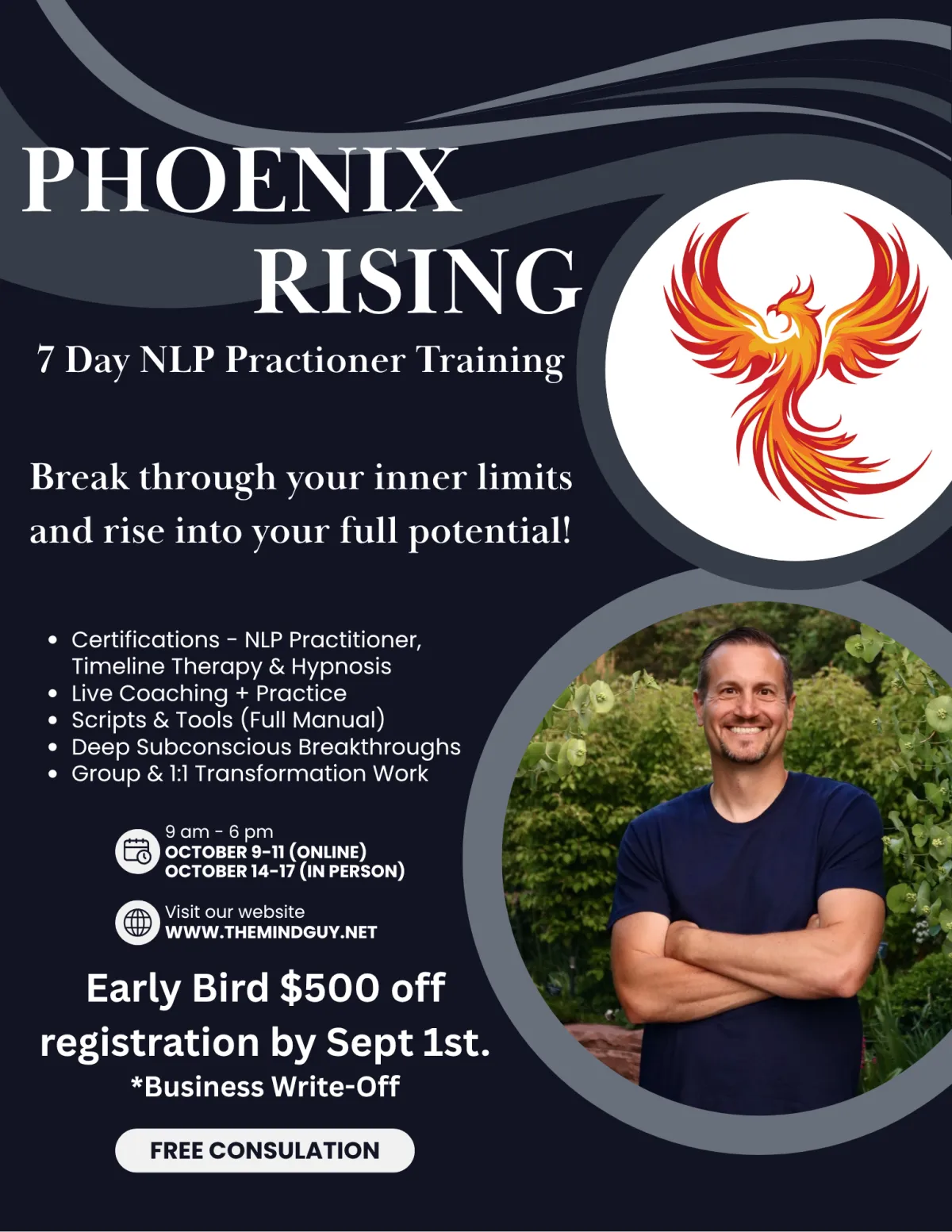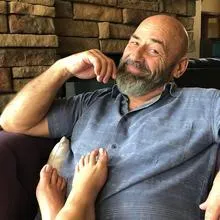Call Now: +1 303-747-4394

7 Day NLP Practitioner Training
Learn the basics of NLP & Hypnosis.
Participate in a Group Hypnosis Session.
Spend the last hour enjoying lunch during an interactive Q & A.
9:00 AM – 6:00 PM
October 9-11 (Online or In Person)
October 14-17 (In Person)
855 Inca Street, Denver

7 Day NLP Practitioner Training
Learn the basics of NLP & Hypnosis.
Participate in a Group Hypnosis Session.
Spend the last hour enjoying lunch during an interactive Q & A.
October 9-11 (Online or In Person)
October 14-17 (In Person)
855 Inca Street, Denver

Your mind works very much like a computer.
It stores, files, it processes data in a particular way, it generalizes, deletes and distorts information, and your unconscious mind takes in millions of bytes of information every second.
People who come to me no longer want to live the same patterns they have been living.
Either it be a bad habit, the same romantic relationship that doesn't work out, low self-worth, imposter syndrome, money blocks, trauma, phobias, weight loss and the list goes on and on. My goal is to help people get what they want in their lives.
I am an
Engineer of the Mind and the major tools I use are
Coaching, Hypnotherapy, Neurolinguistic Programming (NLP) & Timeline Therapy.
*I don't accept insurance, but I do accept FSA(FLEX) and HSA cards.


Nearly any issue or problem can be solved by working with the mind.
There are a set of tools that are so powerful that the change can happen rapidly and permanently. What is that one result you want?
Most people don't realize their unconscious mind drives their behavior and that's where the work needs to be done.
Otherwise you will be in the same place a year from now or even worse -- for the rest of your life!
Think about how long you have had this issue for and make a choice to break free from it!
You can experience rapid transformation in a short period of time. Start with a free consultation!
Nearly any issue or problem
can be solved by working with the mind.
There are a set of tools that are so powerful that the change can happen rapidly and permanently. What is that one result you want?
Most people don't realize
their unconscious mind drives their behavior and that's where the work needs to be done.
Otherwise you will be in the same place a year from now or even worse -- for the rest of your life!
Think about how long you have had this issue for and make a choice to break free from it!
You can experience rapid transformation in a short period of time. Start with a free consultation!


Mind Hacks for Success
The Mind Hacks for Success are a set of tools that will propel you forward towards success. These short videos will give you powerful resources towards moving forward to a better life.
Create your life by speaking
Jump start into action
Doing things you don't really want to do
How to remember things (like people's names)
How to instantaneously get focused
How to limit bad things from happening to you
How to change your self-image
How to overcome a bad memory (not traumas)
Click on the link to access the videos for free!
Mind Hacks for Success
The Mind Hacks for Success are a set of tools that will propel you forward towards success. These short videos will give you powerful resources towards moving forward to a better life.
Create your life by speaking
Jump start into action
Doing things you don't really want to do
How to remember things (like people's names)
How to instantaneously get focused
How to limit bad things from happening to you
How to change your self-image
How to overcome a bad memory (not traumas)
Click on the link to access the videos for free!

15 Hour Breakthrough Session
Do you have a serious problem and want it resolved fast?! Spend 15 hours with me, broken up in 1.5 - 2 hour sessions, diving deep into the subconscious mind, we will explore the root cause of your limitations and we will do a major clearing out of the past. We will find the core beliefs getting in the way of what you want in life and we will use powerful tools to clear out those limitations. This is a massive transformation in a very short period of time.
Click the button below to schedule a free consultation to learn more!
Year long Coaching Program
You will work with me 1-1 weekly for 50 weeks. You will transform every area of life; health, wealth, relationships, confidence, family, and habits. A variety of different tools will be used; NLP, timeline therapy, parts integration work, and hypnosis.
Click the button below to schedule a free consultation to learn more!
7-Day NLP Practitioner Training
Do you want to take your coaching or therapy skills to the next level? Or do you just want the user manual for your operating system? You will add more than 20 skills to your toolbelt and will be able to achieve power and fast results for yourself and your clients. The certification will be for neurolinguistic programming, timeline therapy and a day of hypnosis.
Click the button below to schedule a free consultation to learn more!
What do you need?
Free consultation
You can have everything you want in life. All you need to do is find out what is in the way of turning your dreams into reality. Let's discuss the one thing you truly desire and the steps to take to receive it!
Click the button below to schedule a free consultation to learn more!

Testimonals

NICK DIAK
An amazing man. I'm glad I've gotten to know Thomas - very inciteful individual with a very cool past if you ever get a chance to ask him. He does amazing work and has an obvioImageus passion for what he does .


VANETTE STARR
I've been to other hypnotherapists, and I'd say Thomas is one of the best. Went to him for dealing with my health challenges. In one session, he was able to, gently and with great wisdom, tailor my session to exactly what was needed. Hopefully, if you're aware of your own need/desire for growth and change, you'll already know...there's always deeper work to be done. He's definitely worth the time and resources, plus a grateful healer with much integrity. Certainly, recommend The Mind Guy! Blessings...


RON ROBARE
I worked with Thomas to free myself to be more creative, in an artistic way. Thomas helped me to realize that I had been very creative in business and that there was a reason I was not also using that same creativity in an artistic sense. I am now loving being a potter, and am creating new and accomplished pieces which make me both happy and proud. The process was done quickly, and with great sensitivity on his part.


ALEXANDRIA P.
I met Tom through a mutual friend. He is a genuinely good human who strives to help others any way he can. I came to him desperate to remove a barrier that I had with myself regarding my body. I struggled with not being able to see myself properly- as body dysmorphia- which is something that was present in my life for as long as I could remember. I had never been hypnotized before, and wasn't sure if it was going to help. I'm sort of blown away by how large of an impact this experience has made on my self view. I no longer have the negative emotions that I was experiencing when I looked in a mirror. 100% recommend this person!


JOEL PUCKETT
Thomas - the Mind Guy - helped me out tremendously! Firstly, I had never had hypnosis or NLP therapy before and he created a safe space and explained these procedures clearly so I felt comfortable during the entire process. Not only did I have two transformative and lasting shifts in being more trusting and open in my relationship but I also was taught tools that I am still using on a daily basis. I recommend this service for anyone looking to explore a lasting transformation in their life.


JAKE POND
The Mind Guy has changed my life for the better. I came in with so many fears and so much pain from the past. When I think back to the moments that used to bring me pain, all I feel now is pure bliss. Past life regression- this was insanely cool. I highly recommended trying this once!


Matrix Hacking
Your unconscious mind is a quantum computer. Most people try to use willpower to change their behavior, but it's the hardest way to create positive change. Willpower doesn't always work because patterns and behaviors are driven by programming in the unconscious mind. Hire someone who is well trained in the unconscious mind.
Abandonment
Addictions
Regression
Aggression
Agoraphobia
Alcohol Issues
Anesthesia
Anger
Anxiety
Assertiveness
Healing
Attitude Adjustment
Bed Wetting
Body Dysmorphia
Career Success
Change Habits
Child Birth
Chronic Pain
Communication
Concentration
Compulsive Spending
Controlling behavior
Cramps
Cravings
Creativity
Death or Loss
Discouragement
Understanding Dreams
Exam/Test Anxiety
Increase Exercise
Fear of any kind
Fear of Animals
Fear of DeathFear of DentistFear of DoctorFear of Failure
Fear of Flying
Fear of Heights
Fear of Losingof Control
Fear of Success
Fear of Surgery
Fear of Rejection
Fear of WaterForgiveness
Frustration
Gagging
Gambling
Guilt
Hair Twisting
Headaches
Helplessness
Hopelessness
Hypochondria
Hostility
Hypertension
Immune System
Impotency
Improve
Health
Improve Sales
Inner-Child Issues
Indecision
Inferiority
Inhibition
Insecurity
Insomnia
Irrational thoughts
Irritability
Jealousy
Lack of Ambition
Lack of Confidence
Lack of Direction
Lack of Initiative
Loneliness
Finding Love
Memory
Trust Issues
Moodiness
Motivation
Nail Biting
Nausea
Neglected communities
Negativism
Nightmares
Obsessions
Overeating
Overly Critical
Pain Management
Panic Attacks
Passive-Aggressive
Past Life Regression
Perfectionism
Performance Anxiety
Pessimism
Phobias
Post-surgical
Premature Ejaculation
Pre-surgical
Problem Solving
Procrastination
Public SpeakingReach Goals
Relationships
Relaxation
Resistance to Change
Responsibility
Restlessness
Sadness
Finding your Purpose
Self-Awareness
Self-Blame
Self-Confidence
Self-Control
Self-Criticism
Self-Defeating Behaviors
Self-Esteem
Self-Expression
Self-Image
Self-Mastery
Sexual Problems
Sex Performance
Shame
Sleep Disorders
Smoking Cigarettes/Pot
Social Phobia
Sports
Stage Fright
StressStudy Habits
Stuttering
Stubborn
Substance Abuse
Superiority
Surgical Recovery
Temptation
Trauma Abuse
Trust Issues
Vaping
Victimization
Vulnerability
Weight Loss
Worry
Powered by HypnoBiz-in-a-Box™
